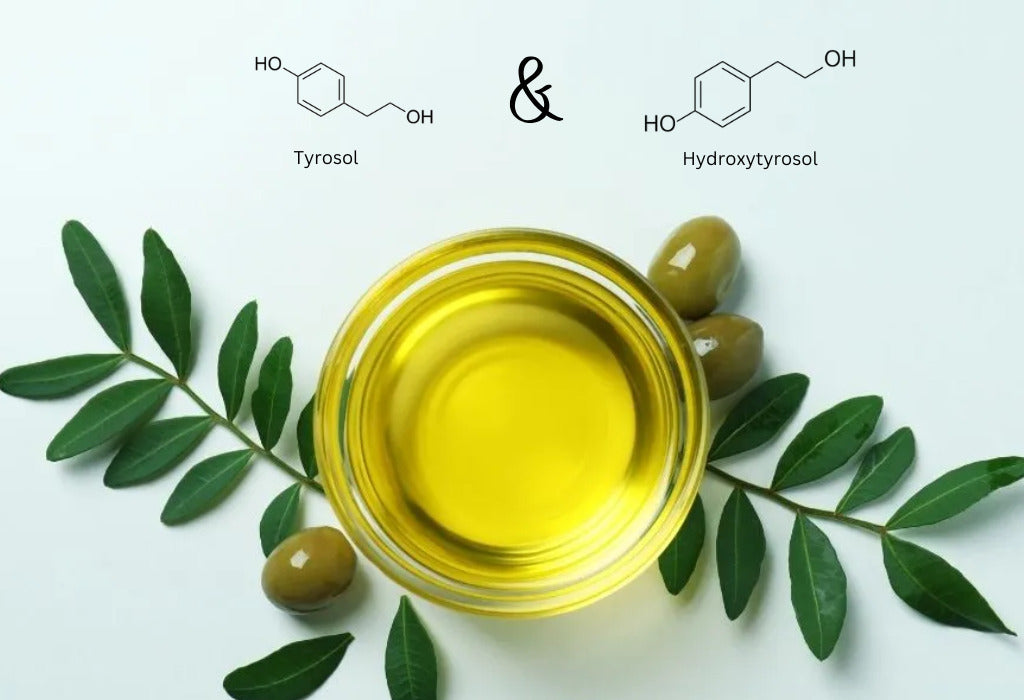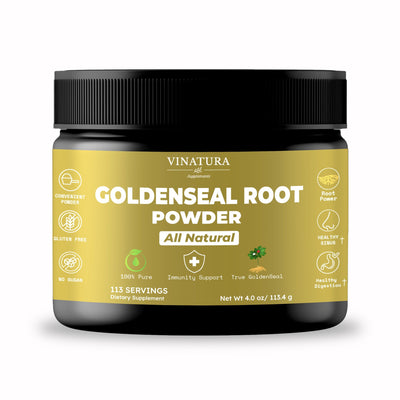
Tyrosol And Hydroxytyrosol: What Are The Differences?
Tyrosol and hydroxytyrosol are two highly regarded compounds found in olives and olive oil extracts. Both exhibit strong antibacterial, anti-inflammatory, and antioxidant properties, offering significant health benefits, particularly in boosting natural immunity.
These natural components provide advantages without the use of chemically formulated medications. For detailed insights into tyrosol and hydroxytyrosol and to understand how to use them safely and effectively, please read the following article. This will help you make informed choices about their use.
Before exploring further, please read the disclaimer located at the end of this webpage.
Key Takeaways
- Tyrosol and hydroxytyrosol are both phenolic compounds found abundantly in olives, but they differ in properties, states, water solubility, and melting points.
- Hydroxytyrosol has stronger antioxidant capabilities compared to tyrosol.
- The FDA recommends a daily intake of 51.06 mg of either tyrosol or hydroxytyrosol (equivalent to ½ tablespoon of olive oil) for general health support.
Things To Know
About Tyrosol
Tyrosol (also known as 2-hydroxyethyl phenol, p-hydroxyphenyl alcohol,...) is a phenolic compound (*) known for its strong antioxidant properties, which can help neutralize free radicals. It is found in olive oil, olives, wine, etc. Tyrosol typically exists as a solid, colorless substance (at room temperature), is slightly soluble in water, and melts at 91–92°C, boiling at 158°C [1].
(*) Phenolic compounds are a group of substances known for their powerful antioxidant properties, including over 8,000 smaller compounds derived from natural metabolic processes in plants.
About Hydroxytyrosol
Like tyrosol, hydroxytyrosol is also a phenolic compound with strong antioxidant properties, commonly found in ripe olives, olive oil extracts, etc. Hydroxytyrosol primarily exists as esters (either liquid or solid, with a low boiling point) compared to tyrosol.
Tyrosol And Hydroxytyrosol: Comparison Table
|
Tyrosol |
Hydroxytyrosol |
|
|
Chemical Formula |
HOC6H4CH2CH2OH |
(HO)2C6H3CH2CH2OH |
|
State |
Solid, colorless |
Liquid, colorless, slightly pungent |
|
Solubility in Water |
Slightly soluble |
Soluble |
|
Melting Point |
91–92°C |
Lower than tyrosol, but not precisely determined |
|
Antioxidant Ability |
Weaker than hydroxytyrosol |
Stronger than tyrosol |
|
Antioxidant Ability |
Olives, olive oil, wine, green tea, beer,... |
Olives, olive oil, wine,... |
Tyrosol And Hydroxytyrosol Benefits

Tyrosol and hydroxytyrosol provide various health benefits such as:
- Powerful Antioxidant Properties: Both tyrosol and hydroxytyrosol can reduce oxidative stress and protect against LDL cholesterol oxidation. This contributes to overall cardiovascular health [2].
- Effective Anti-Inflammatory Properties: They reduce the release of pro-inflammatory cytokines, chemokines, and growth factors (such as IL-6, IL-8, CXCL13) and inhibit inflammatory molecules and macrophage activation, helping to manage inflammation [2, 3].
- Antibacterial Support: Tyrosol and hydroxytyrosol have antibacterial properties, protecting the body from environmental threats.
- Cardiovascular Health Support: They help maintain stable HDL cholesterol levels, supporting overall cardiovascular wellness [4].
Tyrosol And Hydroxytyrosol Side Effects
Current research suggests that tyrosol and hydroxytyrosol are safe and promising for overall wellness. However, excessive consumption may lead to unwanted side effects. The FDA recommends a maximum daily intake of 51.06 mg, and exceeding this amount may cause issues like dizziness, nausea, and fatigue [5].
Should You Choose A Supplement Containing Tyrosol Or Hydroxytyrosol?
Both tyrosol and hydroxytyrosol are beneficial. However, hydroxytyrosol is more potent and easily absorbed, making it an ideal choice for overall health improvement. Before use, consult with a healthcare professional to determine the best option for your specific health needs.
Frequently Asked Questions
What Are The Side Effects Of Taking Olive Extract?
Olive extract may cause some side effects, such as: Allergies: Some individuals may be allergic to any component of olive extract, resulting in symptoms like itching, runny nose, nasal congestion, and swollen eyes. Interaction with Medications: Olive extract can interact with medications, potentially reducing their effectiveness. Digestive Disturbances: Inappropriate use of olive extract may cause stomach pain, diarrhea, acid reflux, and heartburn. Liver Function Issues: Olive extract may affect liver function, impacting the body's ability to detoxify.
How Much Hydroxytyrosol Can You Take A Day?
The FDA recommends a maximum daily intake of 51.06 mg of hydroxytyrosol from foods (such as olives and olive extracts) and dietary supplements [5].
Can Hydroxytyrosol Help You Lose Weight?
Yes, hydroxytyrosol can enhance the body's metabolic processes, particularly in mitochondria, which convert nutrients absorbed from food into energy for various organs. It also helps reduce insulin resistance and lower blood lipid levels. As a result, nutrients are efficiently converted into energy rather than stored as fat, supporting weight management or maintaining a desired weight.
What Is The Best Source Of Hydroxytyrosol?
Extra virgin olive oil is an ideal source of hydroxytyrosol. You can also find hydroxytyrosol in grapes and wine.
What Foods Are High In Tyrosol?
Similar to hydroxytyrosol, tyrosol can be found in olives, olive oil extracts, and grape wine. Ensure the products are pure and sourced transparently.
Conclusion
The information provided offers an overview of tyrosol and hydroxytyrosol, allowing you to compare and safely incorporate them into your diet. For optimal results and safety, consult a healthcare professional for guidance on the appropriate type and daily dosage.
Don't forget to check out other articles on the website for more valuable health tips!
References
- [1] Caruso, G., Torrisi, S. A., Mogavero, M. P., Currenti, W., Castellano, S., Justyna Godos, … Filippo Caraci. (2021). Polyphenols and neuroprotection: Therapeutic implications for cognitive decline. Pharmacology & Therapeutics, 232, 108013–108013. https://doi.org/10.1016/j.pharmthera.2021.108013.
- [2] Zoubdane, N., Abdo, R.-A., Nguyen, M., Bentourkia, M., Turcotte, E. E., Berrougui, H., … Khalil, A. (2024). High Tyrosol and Hydroxytyrosol Intake Reduces Arterial Inflammation and Atherosclerotic Lesion Microcalcification in Healthy Older Populations. Antioxidants, 13(1), 130. https://doi.org/10.3390/antiox13010130.
- [3] Santarelli, R., Pompili, C., Saveria, M., Evangelista, L., Gonnella, R., & Cirone, M. (2022). 3,4-Dihydroxyphenylethanol (DPE or Hydroxytyrosol) Counteracts ERK1/2 and mTOR Activation, Pro-Inflammatory Cytokine Release, Autophagy and Mitophagy Reduction Mediated by Benzo[a]pyrene in Primary Human Colonic Epithelial Cells. Pharmaceutics, 14(3), 663–663. https://doi.org/10.3390/pharmaceutics14030663.
- [4] Boronat, A., Mateus, J., Soldevila-Domenech, N., Guerra, M., Rodríguez-Morató, J., Varon, C., … Rafael. (2019). Cardiovascular benefits of tyrosol and its endogenous conversion into hydroxytyrosol in humans. A randomized, controlled trial. Free Radical Biology and Medicine, 143, 471–481. https://doi.org/10.1016/j.freeradbiomed.2019.08.032.
- [5] FDA. (2015). Gras Notification. https://www.fda.gov/media/96937/download.
Author

Product Disclaimer
The dietary supplement products mentioned on this website are formulated based on scientific research and adhere to FDA guidelines for dietary supplements. However, the content of the articles has not been evaluated by the Food and Drug Administration (FDA) and is not intended to promote or endorse any specific product. Any products sold on this website are not intended to diagnose, treat, cure, or prevent any disease.
Opinions and Endorsements
Any claims, statements, or opinions expressed in the articles are those of the author(s) and do not necessarily reflect the views or opinions of the manufacturers of the dietary supplement products. The products sold on this website are separate from the content of the articles and are not directly endorsed or associated with the information presented here.
Liability Disclaimer
The author(s) of the articles, website, and manufacturers of the dietary supplement products do not assume any liability for any potential consequences arising from the use of the information provided in the articles. It is recommended that individuals consult with a qualified healthcare professional before making any dietary or lifestyle changes, including the use of dietary supplements.
Product Usage
Please refer to the product labels and packaging for specific usage instructions and guidelines for the dietary supplement products sold on this website.
Customer Support
For any concerns or questions regarding the dietary supplement products, please contact our customer support team, who will be more than happy to assist you.





Leave a Comment
Be the first to comment.
What do you think?